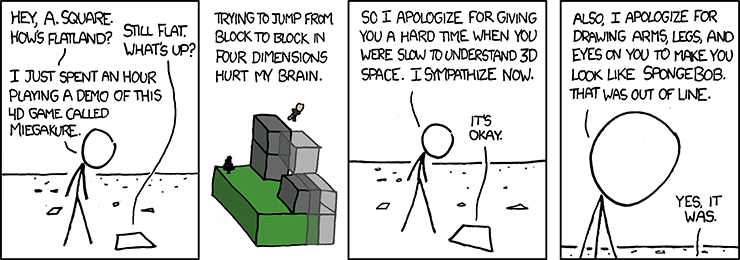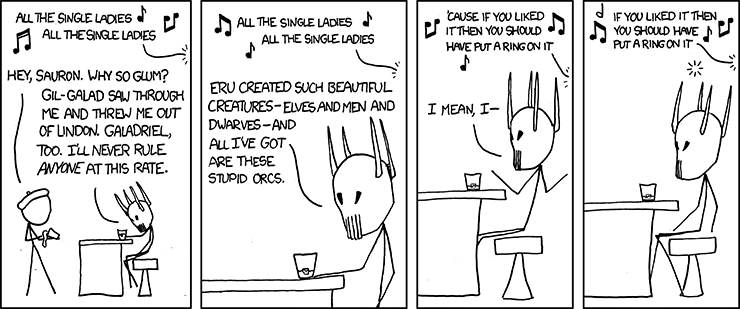
Wednesday, March 31, 2010
Saturday, March 27, 2010
It Didn't Work
I'm sure it's not a comment on the good people of Pennsylvania, since I know quite a few highly intelligent people from there. However, this does not describe any of them. I bet the possum was annoyed, too.
Friday, March 19, 2010
Ritual, Interrupted
So, it's a beautiful Friday afternoon, the kind of warm Carolina day that anticipates Spring as surely as the buds on the trees. And, like every Friday afternoon for the past couple of years, when we're both at work, I went to the bank to pick up Lisa for our once-a-week lunch out. As I drove over, window down, I was listening to one of my current favorite CDs, Lady Antebellum's Need You Now. There seemed to be no need to take a cue from the title song's tale of both halves of broken relationship trying to reach out in a futile grasp for what can't be held onto.
Unlike most Friday afternoons, Lisa was stuck at the bank, waiting on customers. We both knew there was no way she'd be able to get out and join me for what is a high point of the work week for us both.
I tooled over to Zaxby's, got her the Kickin' Chicken sandwich meal and large Diet Coke she likes, dropped it back with her at the bank, and then went to Chick-Fil-A, where I proceeded to drown my sorrows in a #1 meal with a large Coke Zero. I'm sure I looked like a real Sad Sack geek, eating my chicken sandwich and fries with my phone in my hand. I mean, who could know that I was reading Moby Dick while I was there missing my wife?
Yes, I could have turned the rest of my day into It-Sucks-To-Be-Eddie-Friday, but why? It's still a beautiful afternoon, Lady Antebellum still sounds as sweet -- Hello World is a wonderful song for when you're feeling a little blue -- I'm going to see Lisa at home this evening, and we're going to have another turn at one of the rituals of our marriage next Friday afternoon. All in all, it's not so bad being me.
Unlike most Friday afternoons, Lisa was stuck at the bank, waiting on customers. We both knew there was no way she'd be able to get out and join me for what is a high point of the work week for us both.
I tooled over to Zaxby's, got her the Kickin' Chicken sandwich meal and large Diet Coke she likes, dropped it back with her at the bank, and then went to Chick-Fil-A, where I proceeded to drown my sorrows in a #1 meal with a large Coke Zero. I'm sure I looked like a real Sad Sack geek, eating my chicken sandwich and fries with my phone in my hand. I mean, who could know that I was reading Moby Dick while I was there missing my wife?
Yes, I could have turned the rest of my day into It-Sucks-To-Be-Eddie-Friday, but why? It's still a beautiful afternoon, Lady Antebellum still sounds as sweet -- Hello World is a wonderful song for when you're feeling a little blue -- I'm going to see Lisa at home this evening, and we're going to have another turn at one of the rituals of our marriage next Friday afternoon. All in all, it's not so bad being me.
Wednesday, March 17, 2010
Rescuing The Strays
I do not think that all those who choose wrong roads perish; but their rescue consists of being put back on the right road. A sum can be put right: but only by going back till you find the error and working it afresh from that point, never by simply going on. Evil can be undone, but it cannot 'develop' into good. Time does not heal it. The spell must be unwound, bit-by-bit, with 'backwards mutters of dissevering power' - or else not. It is still 'either-or.' If we insist on keeping Hell (or even Earth), we shall not see Heaven: if we accept Heaven we shall not be able to retain the smallest and most intimate souvenirs of Hell.
- C.S. Lewis, The Great Divorce
- C.S. Lewis, The Great Divorce
Monday, March 15, 2010
RIP Peter Graves

From "Should you choose to accept this mission...this tape will self-destruct in five seconds" to "Roger, Roger...What's our vector, Victor?", Peter Graves was a smooth and debonair actor. He will be remembered most for his role as Jim Phelps in TV series Mission: Impossible and the pilot Clarence Oveur in the movie Airplane. He played the earnest hero quite ably, then proved capable of comedic subtlety by playing both a send-up of his hero persona and his own straight man in the process.
And after that? He became somewhat of an icon, as his voice became the representation of the Biography series. Not at all a bad resume.
Factoid I didn't know before today -- Peter Graves was the younger brother of Marshal Dillon himself, James Arness.
Wednesday, March 10, 2010
Sunday, March 7, 2010
The Mistborn Trilogy

Imagine a world where the giant red sun is barely visible through an ash-filled sky. All vegetation is brown, and this is seen as normal, because no one remembers a time when plants were any other color. In fact, no even believes plants were ever anything but brown.
Then, imagine that the world is dying, from the very things that once saved it.
This is the world of The Mistborn Trilogy.
The political entity that encompasses this entire world (or at least as much of the world as we are made aware of in the story) is called the Final Empire.
The people of the Final Empire are divided into two classes, the nobility and the skaa. The latter may roughly be considered feudal serfs, as they are not quite slaves, but they are in no wise free; the former are the mercantile class and the local government.
The imperial government is run by two bodies: the bureaucratic Obligators with their tattoos of rank and the autocratic Steel Inquisitors with the spikes driven through their eyes. Together, they oversee the everyday running of the Empire and enforce its religious orthodoxy.
At the absolute apex is the Lord Ruler, who has held power for a thousand years, ever since he saved the world. Or did he?

Brandon Sanderson's trilogy is nothing less than the best written and most powerful work of American fantasy since the first three volumes of Orson Scott Card's Alvin Maker series were published in the latter half of the 1980s.
Sanderson is known for creating unique systems of magic; here, the primary magic is allomancy, in which a practitioner -- who must have a noble bloodline -- ingests and "burns" certain metals. This allows the allomancer, depending on what metal is being burned, to push or pull on any metal in the environment, to riot or sooth the emotions of others, to detect another allomancer burning metal, or to hide his own allomancy.
Physics holds true, in that what happens when an allomancer projects force against metal depends on whether the metal is attached to or lying on something that can resist the force. This makes for some extremely interesting action scenes, and accounts for the fact that no one but allomancers carry or wear metal.
Most allomancers can burn only a single metal. They are known as mistings.
A very few allomancers can burn any allomatic metal. They are mistborn. Magicians therefore have one power or all, nothing in between.
Sanderson is also known for asking, and answering, BIG questions. Faith and leadership are constant threads throughout the 2000+ pages of this narrative. As well, there is a single overriding question to each book of the trilogy.

In Mistborn, we are asked, "What happens when the hero of prophecy fails?"
In The Well of Ascension, the question is "What happens when everything we think we know is wrong?"
And in The Hero of Ages, we must find out "How do we save the world?" This question is neither theoretical nor rhetorical, but literal.
Sanderson's characters are vibrantly, exuberantly alive, and they grow throughout the books. And, the series rewards close attention to detail. There are actions and situations in the first hundred pages of book one that pay off in the last fifty pages of book three.
As you may have guessed, I recommend The Mistborn Trilogy without reservation. It is a truly enriching reading experience.
Subscribe to:
Posts (Atom)
